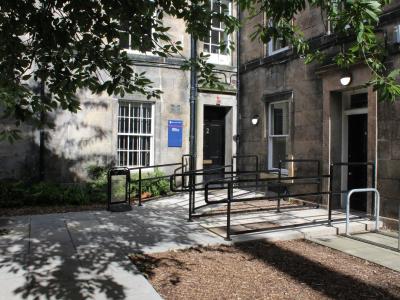
Join us at IASH as part of Doors Open Days 2024, Scotlands largest free festival that celebrates places and stories, new and old.
The Institute for Advanced Studies in the Humanities (IASH) at the University of Edinburgh is one of the world's premier Institutes for Advanced Study. We support innovative research across the arts, humanities and social sciences through a range of interdisciplinary and international projects and programmes. The Institute, an iconic Victorian tenement building, adjoins 6 Hope Park Square - originally Hope House, an 18th century villa built by Sir Thomas Hope of Rankeillor who gifted the Meadows in front of his house to the city. It was once home to author and critic Dame Rebecca West, and appears in her 1922 novel The Judge as the home of her teenage heroine Ellen Melville. In the mid-20th century, the building was the University’s Department of Artificial Intelligence, developing the world’s first thinking robot to combine a seeing eye and feeling hand, “Freddy I”, whose brother (“Freddy II”) can be seen in the National Museum of Scotland. After IASH took over in 1985, the Institute has featured in three novels by Sir Alexander McCall Smith, connecting the Institute’s homely atmosphere to ground-breaking research in the humanities.
Three exhibitions will be on display:
1) Literary Lives at Hope Park Square (ground floor): our latest exhibition explores the life of journalist and author Dame Rebecca West, who lived at 2 Hope Park Square, and featured the building in one of her novels. We also celebrate the Isabel Dalhousie series of books by Sir Alexander McCall-Smith often including scenes at the Institute, and the host of plays written at IASH by our playwrights-in-residence, from David Harrower’s multi-award-winning Blackbird to Rona Munro’s The Last Witch.
2) A Home for Research (first floor): a display of recent books written at IASH by our Fellows. Explore cutting-edge research in history, literature, law, psychology, music, social science and much more. Free copies of texts in our Occasional Papers series are available.
3) Pathways to Peace from Disparate Points (first floor): showing artworks created by Ukrainians and Edinburgh locals together through workshops in music, photography, pottery-making, loom-weaving, and cooking, this exhibition explores the potential of art objects in building compassionate and constructive relationships between people from disparate points of geography, culture, and life. In times of uncertainty, dislocation, and assimilation, personal and cultural objects take on a peculiar solidity, becoming remnants of experience, identity, and memory. The images on display here are remnants of shared experiences and interactions, but also a possible means of visibility and communication among those attending the exhibition. Exhibition originally curated by Dr Caleb Froehlich.
No booking required. Just turn up! You can find more information here.
